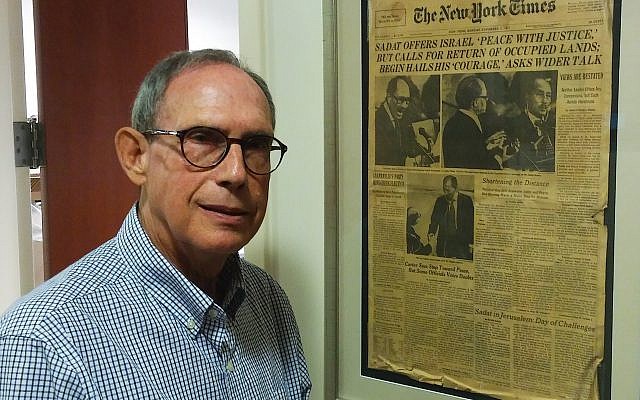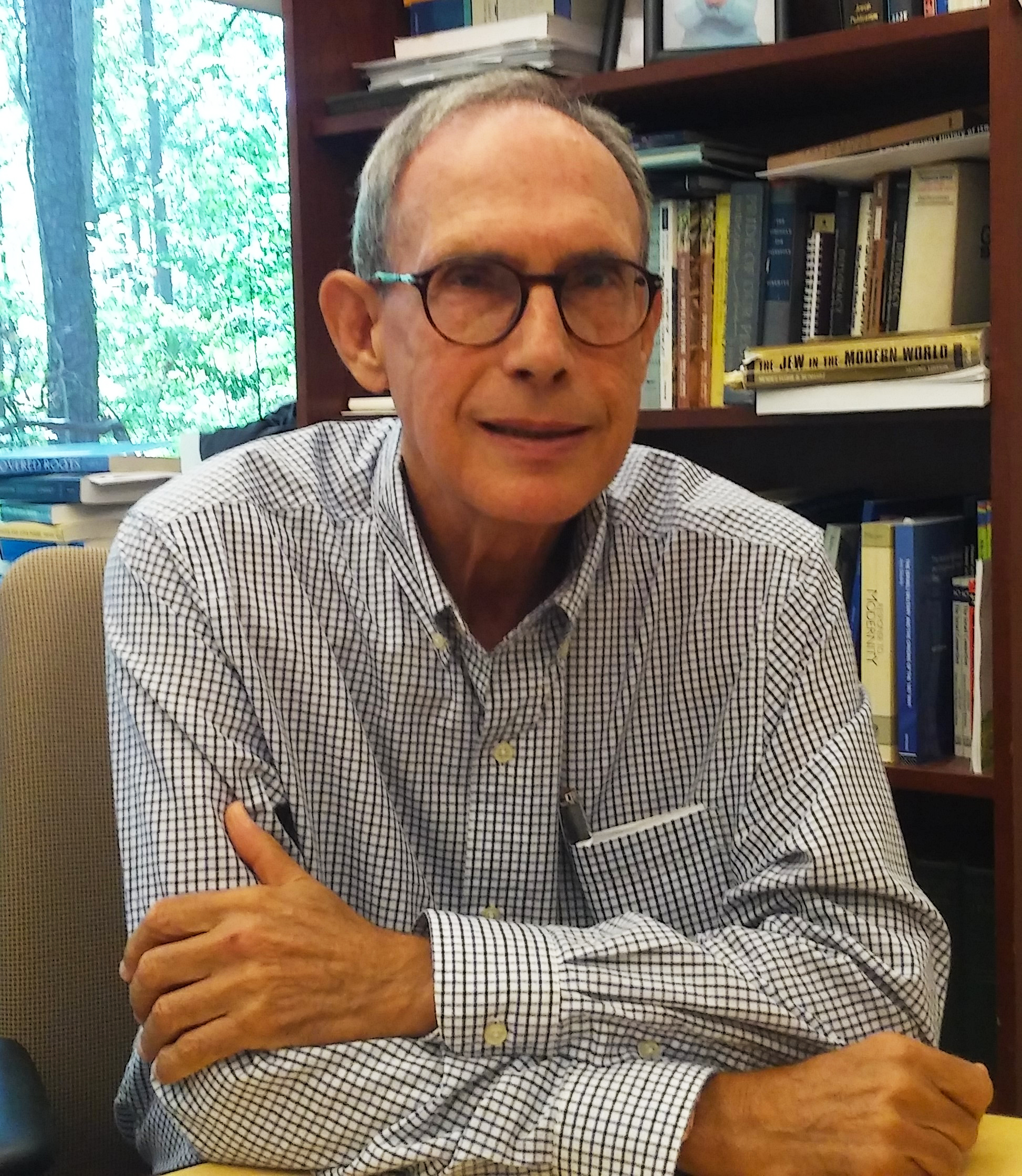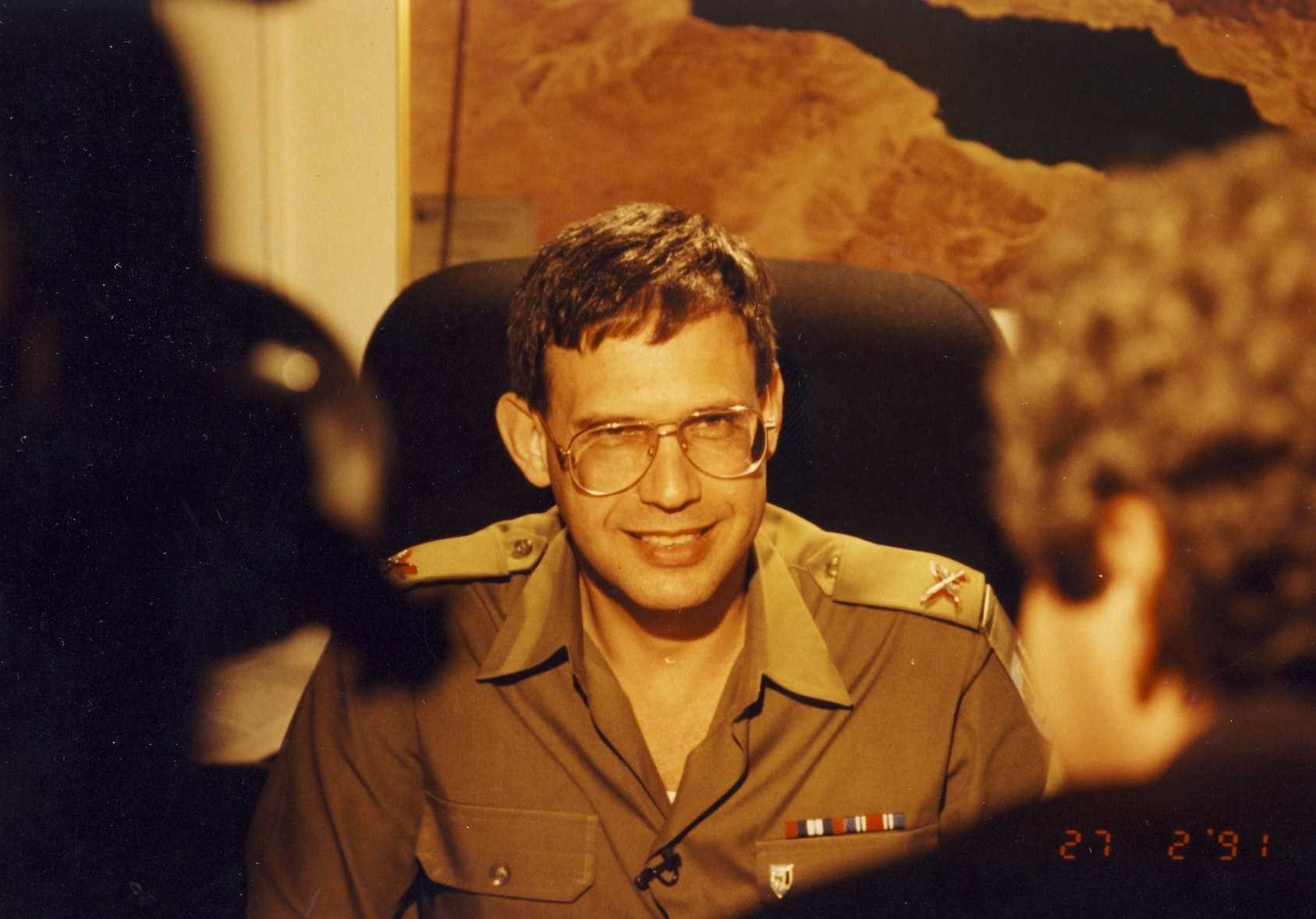Israeli Wartime Voice of Calm Comes to Emory
Nachman Shai understands the importance of both the message and the medium of communication.
Dave Schechter is a veteran journalist whose career includes writing and producing reports from Israel and elsewhere in the Middle East.

During the 1991 Gulf War, as Iraq launched Scud missiles toward Israel, sirens sent Israelis scurrying into rooms sealed with plastic sheeting and tape, gas masks at the ready.
In those nerve-wracking days, Israel Defense Forces spokesman, 44-year-old Brig. Gen. Nachman Shai, was a voice of calm on radio and television, even injecting a little levity by suggesting that Israelis drink water to ease the tension. American audiences knew him from frequent appearances on CNN.
Shai came prepared, having been a political and defense affairs correspondent for Israel’s primary television channel, press secretary for the Israeli delegation at the United Nations and press consultant at the embassy in Washington, D.C. Among the posts he held in later years were chairman of the Israel Broadcast Authority and Director General of the Ministry of Science, Culture and Sport. Shai served in Israel’s parliament, the Knesset, from 2009 to 2019, representing the Kadima, Labor, and Zionist Union parties. In the April 2019 election, he finished below the Labor Party’s threshold for gaining seats.

Shai, now 72-years-old, has brought this wealth of experience to Emory University’s Institute for the Study of Modern Israel, as a grant recipient of the Israel Institute. He will engage with the Emory community and speak publicly about Israel, and also teach two classes in the spring semester, one on public diplomacy and the other on Israel’s nation-building.
During a Sept. 25 interview with the Atlanta Jewish Times, Shai checked online for the latest political news from Israel. Before the interview ended came word that President Reuven Rivlin would give Prime Minister Benjamin Netanyahu, leader of the Likud party, the first opportunity at forming a coalition with at least 61 of the Knesset’s 120 seats. Should he fail, Rivlin might turn to Blue and White party leader Benny Gantz. Netanyahu also faces an Oct. 2-3 hearing that could lead Attorney General Avichai Mandelblit to indict him in connection with three corruption cases.
Shai would not predict the outcome of the electoral or judicial processes. “No more prophets in Israel. We ran out of prophets,” he joked.
As for Netanyahu, whom he has known for more than four decades, “They say he is a magician, but even magicians sometimes run out of rabbits,” Shai said.
The prime minister may be a shrewd politician and steward of Israel’s security, but “Bibi, in the past few years, presents to the public, to the Knesset, to government, ideas, ways, appointments that are totally unacceptable,” leaving Israeli democracy “shaken, like after an earthquake,” Shai said.
“Democracy is not only the rule of the majority. Even in democracy, there are minorities that should be respected and given full rights,” Shai said. “They say, if we are the majority we can do whatever we want, because we are supported by most of the people, but that’s not the way it is.”
The day before the AJT interview he posted on Twitter in Hebrew to the effect that he had come to the United States “to see the greatness of democracy,” but found political turmoil, similar to back home.
While a Knesset member, Shai had earned a Ph.D. in political sciences and communication from Bar-Ilan University. He distilled the lessons he learned as a journalist, politician, government and military spokesman in a 2013 book titled in Hebrew “Milchamedia” (combining the Hebrew word for war, “milchama,” with the word “media”), and in English as “Hearts and Minds: Israel and the Battle for Public Opinion.”
Shai understands the fractious relationship between American Jews and their co-religionists in Israel. “Most American Jews would like to see the Orthodox parties in the opposition, because they were the major force who stopped Netanyahu from any progress on issues that are important to the Reform and Conservative movements in this country,” Shai said. He acknowledged that most Israelis are not concerned with issues of egalitarian prayer at the Western Wall and the way Israel’s government treats non-Orthodox movements.
“What I believe strongly in is to deepen the relations and to look for other venues, for new ideas, new paradigms to bring Jews in Israel and the diaspora, especially in this country, together to overcome the present crisis,” Shai said.
Shai praised the shinshinim program, which brings young Israelis to Atlanta (through a partnership of The Jewish Agency for Israel and the Jewish Federation of Greater Atlanta) and other cities to teach and interact with local Jewish communities. But he would like to see the program expanded to bring thousands to the United States, so that they return home with a deeper understanding of the lives of American Jews.

Having been born in Israel, recent generations are less familiar with life in the diaspora, the worlds their parents and grandparents left, whether it was Europe after the Holocaust or countries in the Middle East and North Africa after 1948.
The primary obstacles to improving relations between Israeli Jews and the diaspora are “ignorance and arrogance, on both sides,” Shai said.
Israelis often scold American Jews for their criticism, when they don’t live in the country, pay taxes there, or serve in its military. “Are they allowed to express their own views about what we are doing here? My answer, by the way, is yes, yes, and yes. Three times, yes. Yes, I expect you to express your own view on Israeli democracy. … Because you care. Because we share the same values. Because you appreciate democracy as much as we should,” Shai said. And because Israel asks American Jews to lobby in support of foreign aid and to be active against the BDS (Boycott, Divestment, and Sanctions) movement, “If we need you, you are totally eligible to raise with us issues that are in your mind.”
Despite his position in the center-left of Israel’s political spectrum, Shai gave a positive assessment of President Donald Trump. “If I should judge Trump only by what he did for Israel, he is one of the best presidents ever,” he said. Shai cited Trump’s declaration of Jerusalem as Israel’s capital, recognition of the Golan Heights as Israeli territory, and stance against Iran’s nuclear program. The internal machinations of the Trump administration aside, “If you judge it by the general policy, it’s a very friendly administration, when it comes to Israel.”
Shai has come to a campus that last spring experienced a controversial incident involving pro-Palestinian flyers, prompting sharp disagreements between pro-Israel and pro-Palestinian students.
“And I am one of those Israelis who are calling for the government to take the initiative to try and find a solution, between us and the Palestinians. We can’t just wait to see what will happen. The status quo is terrible. … It has implications in the Israeli society, on the young generation of Israelis, on generations of Israelis, on young generations of American Jews, as well,” said Shai, adding that he supports “two states for two peoples … living side by side in two different political entities,” but without a divided Jerusalem.
“I don’t want to leave the world, and I don’t want my children to inherit, this impossible situation where Jews and Palestinians are fighting with each other,” Shai said.
He and his wife of 43 years, Rivka, have three children and seven grandchildren, living in New York and Israel. Shai said his wife looks forward to sampling Atlanta’s cultural institutions.



comments